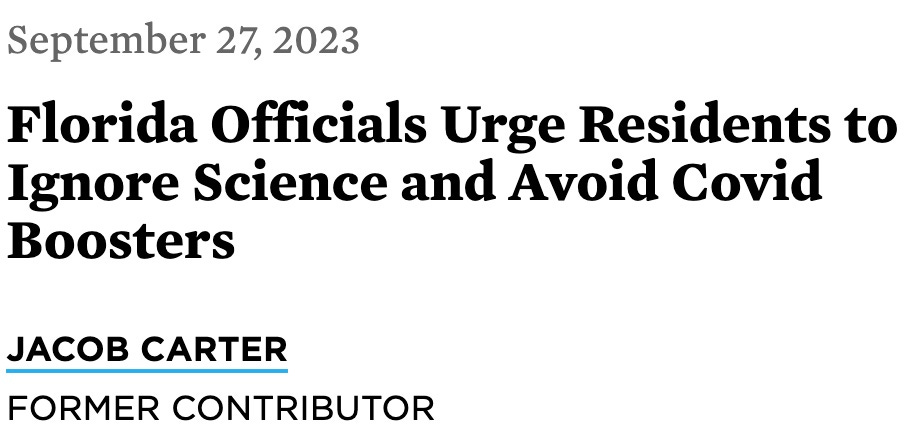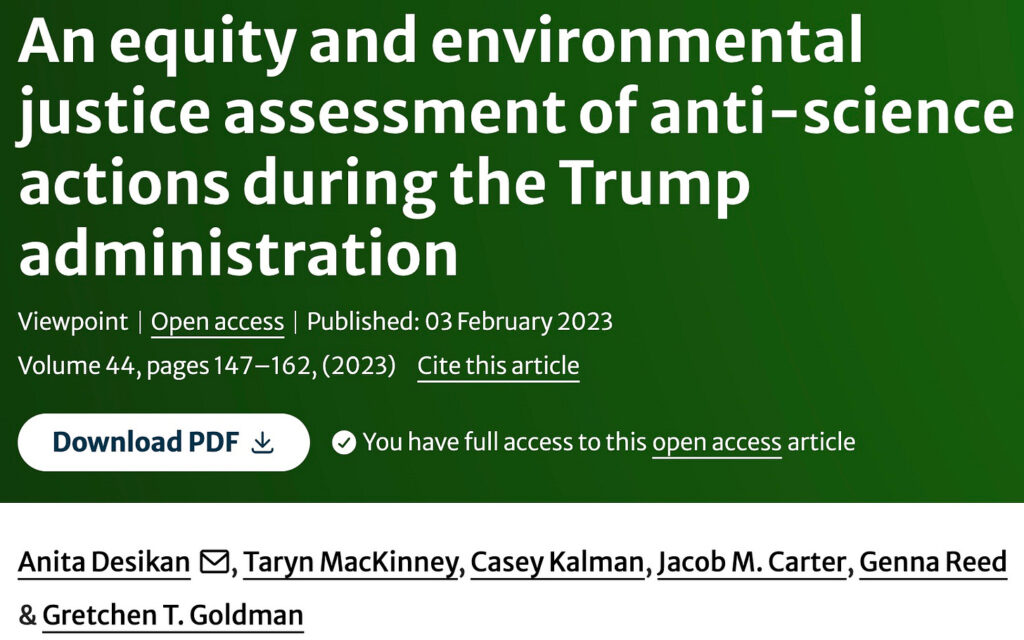2 young ideologues create many straw men to beat up on Trump’s Gold Standard Science EO. Their flowery language conceals a contempt for truth
IMHO practically all federal science has had one objective: backing up policy--and I am really hoping those days are over and real science might actually be supported.
Who are the authors of this drivel? Wikipedia tells us that “Gretchen Goldman is an American environmental scientist, policy advocate, and the president of the Union of Concerned Scientists.[1] In 2024 she was the climate change research and technology director at the U.S. Department of Transportation…As the climate change research and technology director at the U.S. Department of Transportation in 2024, Goldman was recognized for her work on decarbonization of the transportation sector and her efforts to improve community resilience in the face of climate change…” At Union of Concerned Scientists “she led research in environmental justice“
She must be pretty angry that she chose the wrong career horse and her field is finally imploding. Then again, she chose a phony science because that was where the money and the virtue signalling conjoined. But UCS may continue to pay her to do more of this.
Jacob M. Carter was until recently also at the Union of Concerned Scientists, where he has been since completing his post-doc. Both these authors are policy pundits who have not done scientific research since completing their studies, but with PhDs after their names, wrap themselves in The Science. Jacob writes a lot, such as this gem:

From his website:
“I also am an independent researcher investigating climate change issues from the effects of extremely warm and dry years on the physiology and phenology of trees to the mathematical modeling of greenhouse gas emissions via siting renewable energy installations on contaminated lands using life cycle analysis.”
Here is their article, published without a paywall in today’s STAT:
Trump’s ‘gold standard’ order is a blueprint for politicizing science
Ultimately, the order risks widening the very gaps it claims to close
By Jacob M. Carter and Gretchen T. Goldman
June 9, 2025
On May 23, the Trump administration issued an executive order titled “Restoring Gold Standard Science.” Using agreeable rhetoric, the order says that it aims to safeguard scientific rigor, prevent misconduct, and restore public trust in government science.
But beneath this golden gloss lies a return to strategies that threaten to weaken federal science, dismiss scientific findings, and open the door to political manipulation of evidence-based policy.
[As if that was not de rigeur until now—Nass]
One striking example is its directive that agencies must make public “the data, analyses, and conclusions” associated with any scientific information used to shape major policy. On the surface, this appears to champion transparency. But it closely mirrors the first Trump administration’s now-defunct Environmental Protection Agency “Secret Science” rule, which was explicitly designed to exclude studies based on whether they made raw data publicly available.
[Fake equivalence: most scientific journals require that authors make their data available for scrutiny in order to be allowed to publish. All data should be transparent. Of course, not the names of participants, but transparency is the standard of good science, not an aberration as these authors imply. And taxpayer-funded studies should be held to this standard. Why should anyone rely on hidden data?—Nass]
This rule would have prohibited the EPA from considering foundational public health research, especially epidemiological studies that rely on personally identifying health data, unless those studies made individual-level data fully accessible to the public. That kind of disclosure can violate legal and ethical standards, and it is not necessary for ensuring scientific rigor. There is no scientific basis for requiring public access to raw data as a condition for credibility; peer review remains the true gold standard for evaluating scientific validity, and transparency alone does not guarantee trustworthy science.
[We learned how peer review, especially at the top journals, means nothing during COVID. Data transparency is the real gold standard, which these two are trying to trash. And every scientist knows that individual-identifying data must be removed before publication. These authors have created a straw man. And by the way, the authority Goldman cites regarding this is an article by—herself—Nass]
The so-called transparency was a facade: The real goal was to suppress science that impeded regulatory rollbacks of evidence-based health protections. Federal courts struck the EPA rule down, but the tactic behind it resurfaces in this new executive order, now broadened to all agencies.
[The EO calls for unbiased scientific review, which ought to be broadened to all federal agencies. Duh—Nass]
This tactic is not new. Tobacco companies pioneered it in the 1990s to exclude certain health studies from regulatory review. The Trump administration’s renewed emphasis on data disclosure, if implemented similarly, would again allow politically motivated actors to disqualify critical research — not on scientific grounds but on legal technicalities.
[I could go on for days about how federal agencies and the National Academy of Sciences used various tricks to exclude scientific studies they did not want to acknowledge. Goldman and Carter seem to think this scheme is limited to just the bad guys: Tobacco and Trump. But Trump’s EO is evenhanded, simply asking for transparent data in order to value a scientific endeavor when setting policy. Not a legal technicality, kiddos.—Nass]
The executive order also undermines the Biden administration’s 2023 framework for scientific integrity. That framework, developed through the Office of Science and Technology Policy, required all federal agencies to create, update, and ultimately strengthen their scientific integrity policies. It protected scientists’ rights to communicate openly, provided avenues for dissenting opinions, and established ongoing review processes to improve scientific integrity policies over time. By revoking this guidance, the Trump administration turns back the clock.
[Guess what? The authors cite themselves again regarding how the Biden framework strengthened scientific integrity. Except we know it didn’t. Think Fauci, Baric, Daszak, Kristian Andersen, David Morens —Nass]
Some agencies will revert to the less comprehensive Obama-era policies. Others, which adopted scientific integrity standards only recently, may be left without any protections at all. A 2020 analysis by the Union of Concerned Scientists, where one of us is president, found that many Obama-era policies lacked clear procedures for addressing scientific integrity violations, did not allow for differing scientific opinions, or failed to protect scientists from political retaliation. This rollback leaves federal scientists and their work more vulnerable, not less, to political manipulation and suppression.
[Did they read the EO? There are whistleblower protection, enforcement, clear guidelines for what is gold standard science. They hope you won’t read it either. BTW, they cite themselves again as the authority.—Nass]
Perhaps most insidiously, the new order criticizes the use of diversity, equity, and inclusion principles in scientific policymaking. The Biden administration rightly recognized that science cannot be credible if it systematically excludes marginalized voices or fails to consider how policy affects vulnerable populations. Rejecting DEI under the banner of “scientific integrity” reveals a fundamentally political, not scientific, agenda.
[Give me a break. And they cite themselves again, see below—Nass]

Ultimately, the order risks widening the very gaps it claims to close. It disables mechanisms for internal oversight, threatens to block use of crucial studies in government decisions, and silences dissent. This is not a pathway to a “gold standard” — it is a blueprint for politicizing science and marginalizing expertise.
[This is total BS, as the order does no such thing—Nass]
If the administration is interested in “gold standard science,” it should look to recommendations from top science institutions who have long invested in improving how robust, transparent, and reliable the scientific process is. Instead, the administration chose to pull a page from a playbook for politics. When it comes to improving the scientific process, this is an unserious exercise.
The scientific community needs transparent, accountable safeguards for integrity and reliability, but ones that reflect how science actually works. Real transparency includes disclosing funding sources, peer review processes, and clear rationales for policy decisions. It does not mean making confidential health data public or punishing scientists for drawing conclusions inconvenient for the Trump administration’s political agenda.
[Yada yada yada. Notice how the authors fail to cite the EO or quote from it to support any of their (false) assertions?—Nass]
The scientific community must act because the structures meant to protect research from political manipulation are being dismantled. Without strong internal protections, it will fall to scientists themselves to uphold standards of transparency, independence, and rigor. They can do this by serving on advisory committees, submitting public comments on federal agency actions, and publicly speaking out when science is misused or sidelined. Our expertise is critical not only for advancing knowledge but for ensuring that policies reflect the best available evidence.
[They again cite their own organization’s’ work—Nass]
Congress, too, has a role to play. Passing legislation like the Scientific Integrity Act would codify baseline protections across administrations and ensure that scientific evidence retains a central role in federal decision-making. If scientists don’t speak up now, the space for honest, evidence-based governance may shrink even further.
[You can read about this D-sponsored bill below. Much of the rhetoric about it is partisan or in dreamland, like this statment by Goldman’s organization:
https://tonko.house.gov/news/documentsingle.aspx?DocumentID=4336
“Federal scientists work to ensure people can breathe clean air and have access to clean water, safe food and medicine, and consumer products that won’t harm us,” said Jen Jones, PhD, Director, Center for Science and Democracy, Union of Concerned Scientists. “They also help protect the public from extreme weather events, which are worsening due to climate change. Importantly, federal scientists work to address the disproportionate amounts of pollution harming historically marginalized communities. We need to protect the work they’re doing for all of us. The Scientific Integrity Act would ensure that research is independent, uncensored and easily accessible to the public.”
I really wish those federal scientists were keeping our environment clean and protecting us from extreme weather events, but I fear they are actually supporting industrial pollution, causing many of those extreme weather events, and have brought us chemtrails. I think federal environmental science needs a major shakeup—Nass]
If we are to achieve a true gold standard, we need federal leadership that supports, not dismantles, the U.S. science enterprise and whose actions follow a bold positive vision for the future of science. In the meantime, we must defend scientific integrity not just as a professional obligation, but as a cornerstone of democracy, before political agendas redefine what counts as truth.
[Isn’t it tough to read this sophomoric grandstanding? Aren’t you glad this is finally over?—Nass]
Jacob M. Carter, Ph.D., is founder of SciLight and an expert in scientific integrity and federal science policy. Gretchen T. Goldman, Ph.D., is the president and CEO of the Union of Concerned Scientists.